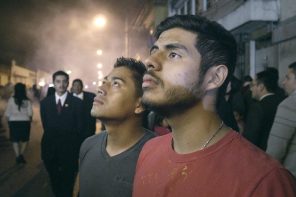Synopses, cast & credits of the movies – of GLBT interest – presented at the 75. Venice International Film Festival; schedule of all the screenings
CALENDAR WITH THE SCREENING SCHEDULE
EL LUGAR SIN LÍMITES
Aug 30 | 16:45 Sala Volpi (Lido) | Free Coupons, All Accreditations
Sep 01 | 11:00 Sala Volpi (Lido) | Free Coupons, All Accreditations
STRANO TELO (FOREIGN BODY)
Aug 30 | 14:00 Sala PalaBiennale (Lido) | Tickets, All Accreditations
Sep 06 | 11:00 Sala Giardino (Lido) | Press, Industry
Sep 08 | 11:00 Sala Giardino (Lido) | Tickets, All Accreditations
FRIEDKIN UNCUT
Aug 31 | 11:15 Sala Volpi (Lido) | Press, Industry
Aug 31 | 16:45 Sala Volpi (Lido) | Free Coupons, All Accreditations
Sep 01 | 22:00 Sala Pasinetti (Lido) | Free Coupons, All Accreditations
SOME LIKE IT HOT
Sep 03 | 14:30 Sala Giardino (Lido) | Tickets, All Accreditations
Sep 04 | 09:00 Sala Volpi (Lido) | Free Coupons, All Accreditations
M BUTTERFLY
Sep 06 | 14:00 Sala Grande (Lido) | Tickets, All Accreditations
IL PORTIERE DI NOTTE
Sep 06 | 14:30 Sala Giardino (Lido) | Tickets, All Accreditations
Sep 07 | 09:00 Sala Volpi (Lido) | Free Coupons, All Accreditations
MORTE A VENEZIA
Sep 07 | 14:30 Sala Giardino (Lido) | Tickets, All Accreditations
Sep 08 | 09:00 Sala Volpi (Lido) | Free Coupons, All Accreditations
For further information: La Biennale di Venezia, biglietteria.cinema@labiennale.org
SYNOPSES, CAST & CREDITS
El lugar sin límites (The Place Without Limits) by Arturo Ripstein (México, 1977, 110’)
La Manuela, a transvestite, and her daughter la Japonesita, run a brothel in the small town of El Olivo, whose boss, Don Alejo, wants to sell. When Pancho, former protege of the boss and client of the brothel, returns to town, both la Manuela and la Japonesita are trapped by his sexual impulses. Pancho, once drunk, shows his homosexual side with La Manuela, triggering a series of dramatic events.
Mexican submission for the Academy Award for Best Foreign Language Film
Restoration: Cineteca Nacional México and Imcine.
Presented in Venezia Classici
Strano telo (Foreign Body) by Dušan Zorić (Serbia, 2018, 20’)
Foreign Body is a story about a guy named Mark who, trying to show handsome friends friends, goes out in the night to find a girl. In encountering a victim of a sexual trauma from the past, he discovers an aggressive part of his personality.
Director’s statement
What is the connection between aggression and sexuality? In the fourth grade of primary school me and my best buddies went to the school toilet and measured who had the biggest penis. We couldn’t agree on it so all three of us had a fist fight still having our penises out. Then came the 90’s, the war and all the violence and hate between former Yugoslavian countries. We were all kids and we didn’t know what was happening. But we grew up, and now it’s time to fuck.
Presented in Orizzonti – Fuori concorso – Corti
Friedkin Uncut by Francesco Zippel (Italy, 2018, 107’)
This documentary offers an introspective look at the life and artistic path of William Friedkin, the extraordinary, maverick director of cult movies such as The French Connection, The Exorcist, To Live and Die in L.A. and Sorcerer. For the first time, Friedkin pushes himself out of his comfort zone by guiding the audience in a fascinating trip through the themes and stories that meant the most during his personal and artistic life.
Though not the main topic of the documentary, among the movies discussed, there’s room as well for Cruising, the queer cult starring Al Pacino. The documentary was partly shot in Lido during last year’s Venice Film Festival.
Presented in Venezia Classici
Some Like It Hot by Billy Wilder (Usa, 1959, 121’)
The Motion Picture Production Code (popularly known as the Hays Code) was officially in place from 1930 until 1968, dictating the moral and ethical content of American films so that moviegoers would not be subject to what it considered degrading material. Despite that later end date, many say the Hays code actually died closer to 1959, following the release of movies like Billy Wilder’s Some Like It Hot, a film made without the code’s approval, effectively raising a middle finger to the organization and stripping the agency of its hold on Hollywood. A gender-bending story of two men dressing in drag to escape the mob, Some Like It Hot is packed full of sexual language and innuendo, was condemned by the Catholic League of Decency for being “seriously offensive to Christian and traditional standards of morality and decency,” was banned outright in Kansas, and, wondrously, received six Academy Award nominations. The film now claims its place in history as one of the greatest comedies of all time, featuring fantastic performances by Jack Lemmon Tony Curtis and Marilyn Monroe’s last major role, and Wilder’s courageous and hilariously forward take on gender roles.
Some Like It Hot put society to the test and challenged moral complacency. The movie hints at homosexuality, studies the male gaze, speaks to female objectification and misogyny, and condemns male insensitivity. As the two male characters (dressed as women) move in and out of various relationships with members of the same and opposite sexes, they blur gender lines and question whether masculinity and femininity are as opaquely binary as society supposes or whether they are constructs facilitated by mannerisms, attire, and perception.
Wilder’s film proved the public was ready for more than the Hays Code had been allowing. Some Like It Hot became a critical and financial success and an icon of cinema, now regularly revered as the director’s best comedy and Monroe’s finest performance.
Restoration: Park Circus in collaboration with Metro Goldwyn Mayer and The Criterion Collection.
Presented in Venezia Classici
M. Butterfly by David Cronenberg (Usa, 1993, 101’)
Set in Beijing in 1964, M. Butterfly is the story of French diplomat René Gallimard, who falls in love with the singer from the Beijing Opera Song Liling, an extraordinary Madama Butterfly. Gallimard sacrifices his wife, compromises his career, passes on classified documents to the woman to save the son he believes she has borne him. Unmasked by counterespionage, at the trial he will discover that Song is not only a spy, but also a man.
Inspired by a true story, written for the theatre by David Henry Hwang who adapted it for film, M. Butterfly is a melodrama about the representation of love, about the self-destructive aspects of its illusions, and about the theme of metamorphosis, so important to Cronenberg: “I am a man who has loved a woman, created by a man”, says Gallimard in the film.
Presented as a tribute to David Cronenberg, winner of the Golden Lion for Lifetime Achievement
Il portiere di notte by Liliana Cavani (Italy, 1974, 120’)
Vienna, 1957. In a luxury hotel close to the Opera House, Max, a former Nazi official who still keeps in touch with his former comrades who try to erase traces of their hideous past, hides living an anonymous, obscure existence working as a concierge. By chance he meets with Lucia, Holocaust survivor with whom Max had a twisted relationship based on fear and sadomasochism in the inhuman context of the concentration camp. Now married to an orchestra conductor, Lucia is instantly captured again by the passion with Max, entangled in a perverse, dangerous game fueled by a past impossible to forget and to process.
Director Liliana Cavani, when the film was released in theaters, was both praised for the boldness in dealing with the disturbing theme of sexual transgression, and bitterly criticized for the extremely controversial plot that exploited Holocaust for the sake of sensationalism.
The image of a of a topless Charlotte Rampling singing for the guards in the camp, long gloves on her arms, her bare breasts covered with braces, the cap of an SS guard perched on her head, became through the year iconic for the queer culture, being imitated countless times. The attire can be seen, just to name two, in music videos by the likes of gay icons Madonna (Justify My Love) and Lady Gaga (LoveGame).
Restoration: CSC-Cineteca Nazionale and Istituto Luce – Cinecittà.
Presented in Venezia Classici
Morte a Venezia by Luchino Visconti (Italy, France, Usa, 1971, 130’)
Around 1910, avant-garde composer Gustave Aschenbach travels to Hotel Des Bains in Lido, the Venetian seaside resort, in search of repose after a period of artistic and personal stress. But he finds no peace there, for he soon develops a troubling attraction to an adolescent boy, Tadzio, on vacation with his family. The boy embodies an ideal of beauty that Aschenbach has long sought and he becomes infatuated. However, the onset of a deadly pestilence threatens them both physically and represents the corruption that compromises all ideals.
Restoration: Cineteca di Bologna and Istituto Luce – Cinecittà in collaboration with Warner Bros. and The Criterion Collection
Presented in Venezia Classici






